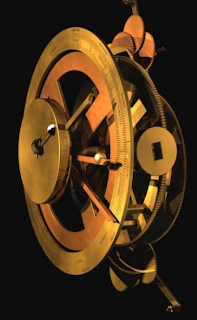 |
| Olympian Apollo |
Why is it that a lot of writers steer clear
of ancient religious practices in fiction?
Is it because it is awkward and clashes
with their own, modern beliefs? Or perhaps it’s because they don’t feel
comfortable writing about something so strange, practices they really know very
little about?
There is a lot of good fiction set in the
ancient world and I am always trying to find new novels to entertain and transport
myself. One thing I’ve noticed is that when it comes to the religious practices
of ancient Greeks and Romans, they are often (not always) portrayed as
half-hearted, greeted with a good measure of pessimism. It might be a passing
nod to a statue of a particular god or goddess, or a comment by the protagonist
that he or she was making an offering even though they didn’t think it would do
any good.
Now, I’m not full of religious fervour
myself; it’s difficult for anyone who has studied history in depth to be so.
However, I see the value of it and respect its meaning for people across the
ages. Religion is not necessarily at the forefront of our thoughts in modern,
western society, but, in the ancient and medieval worlds, faith was often foremost
in people’s thoughts.
It is easy, blinded by hindsight, to
dismiss ancient beliefs in the gods and goddesses of our ancestors.
As a writer, why would I want to dismiss
something that is so important to the period in which my novels take place,
something so important to the thoughts and motives of my characters?
 |
| Goddess Demeter - Elefsis Museum |
People in ancient Greece and Rome (for
example) believed in a vast pantheon of gods and goddesses who governed every
aspect of life. From the emotions one felt or the lighting of a family hearth
fire, to the start of a business venture or a soldier’s march to battle, most
people held their gods and goddesses close. Indeed, there was a god or goddess
with accompanying rituals for almost everything.
Religion enriches the ancient world in
historical fiction and sets it apart from today, transports the reader to a
world that is foreign and exotic. And the beauty is that there is so much
mystery, so little known, that the writer can spread his or her creative wings.
Of course, it’s always important to do as
much research as possible; if the primary texts don’t tell you much then look
to the paintings on ceramics, wall frescoes, statues and other carvings. If you
can get to the actual sanctuaries of the ancient world, even better, for they
are places where even the most sceptical person can feel that there is (or was)
indeed something different going on.
With the Eagles and Dragons series, I wanted to do
something different by having my main characters in close touch with the gods
of their ancestors. Since it is historical fantasy, I can get that much more
creative in having Lucius Metellus Anguis interact with his patron god, Apollo.
In fact, Apollo, Venus and others have a clear role to play and are characters
themselves.
The beautiful thing about the gods of
ancient Greece and Rome is that they are almost human, prone to the same
emotions, the same prejudices that we are. From a certain point of view, they
are more accessible.
 |
| The Pythia of Delphi |
Despite this however, their worship, be it
Apollo, Venus, Magna Mater, Isis, Jupiter, Mithras or any other, is still shrouded
in mystery, clouded by the passage of time. Thousands and thousands of ancient
Greeks and Roman flocked to Elefsis to take part in the mysteries dedicated to
Demeter and Persephone but little is known because devotees were sworn to
secrecy. Oaths then were ‘water-tight’ as the saying went. Also, at one point,
most of the Roman army worshiped Mithras, the Persian Lord of Light and Truth.
Do we know much about Mithraism? Some, but there is still much that is not
known and perhaps never will be. I get into Mithraism in IMMORTUI.
In Eagles and Dragons Book II, Killing the
Hydra (coming this Spring), some of the characters pay a visit to the Oracle of
Apollo at Delphi, which was still revered in the Roman Empire. Today, if you
watch a documentary on Delphi, you will hear about how the oracle was used by
politicians to deliver fabricated answers to those seeking the god’s advice. It
is true that politics and religion in the ancient and medieval worlds were
frequent bedfellows but one can not dismiss the power of belief and
inspiration. If the Athenians had not received the famous answer from the
Delphic Oracle about being saved by Athens’ ‘wooden walls’, then they might not
have had such a crushing naval victory over the Persians at Salamis.
 |
| Temple of Apollo, Delphi |
There is a lot of room for debate on this
topic and many, I suspect, will feel strongly for or against the exploration of
ancient religion in fiction. If we feel inclined to dismiss ancient beliefs, to
have our characters belittle them, to explain them away, we must ask ourselves
why.
Do we dismiss ancient beliefs because we
think they are silly, quaint, barbaric or false? Or do we stay away from them
because we just don’t understand? Taking an interest in them, giving them some
space on our blank pages, doesn’t mean we dismiss our own beliefs, it just
means that we are open-minded and interested in accurately portraying the world
about which we are writing.
For me, my own field of fiction is quite vast
and multi-hued. Like the Roman Empire, all gods and goddesses are welcome to be
a part of the whole and it is my hope that, being inclusive, my stories will be
more interesting, more true to life, more mysterious.












